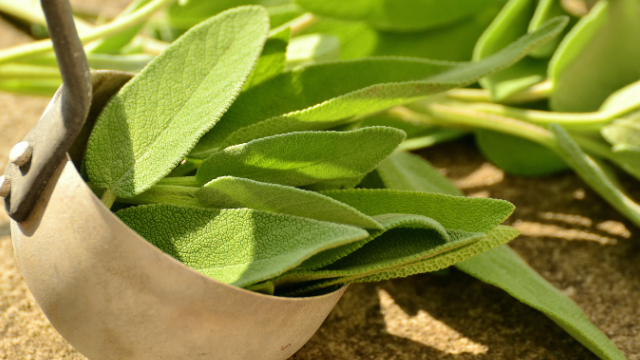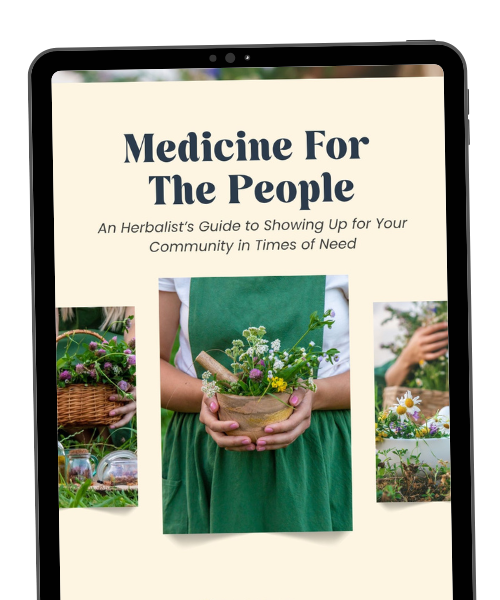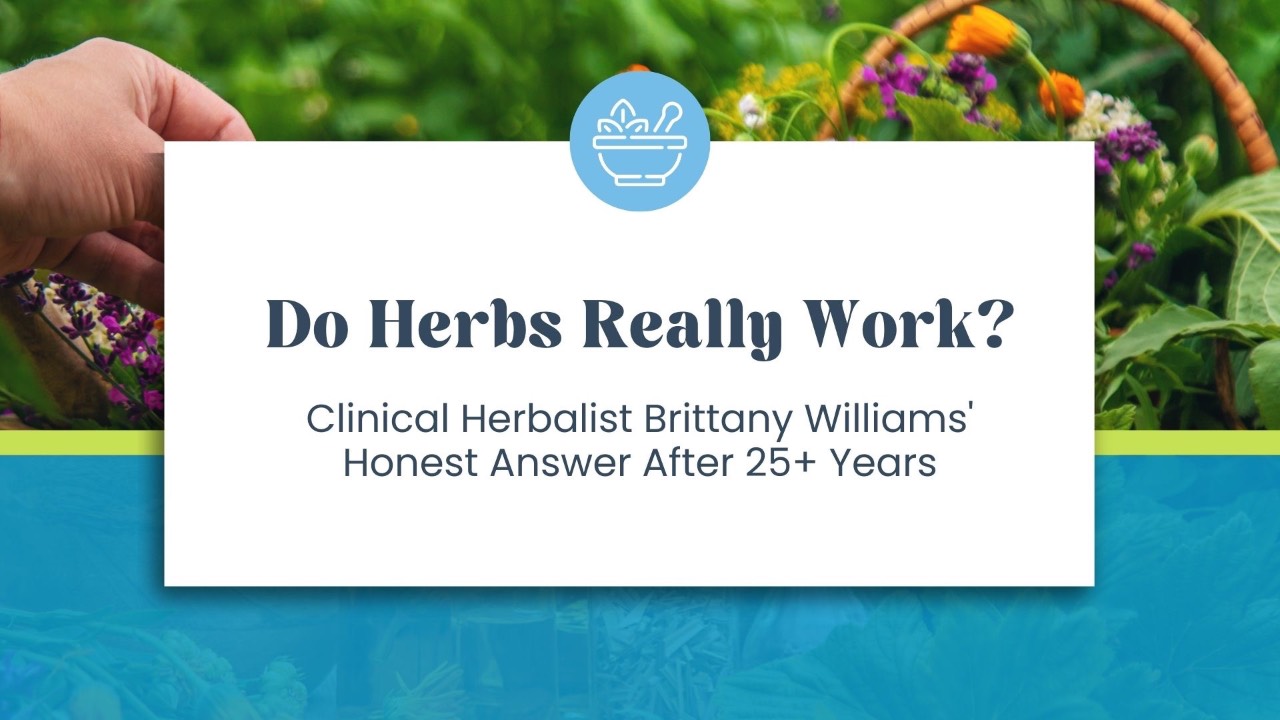Culinary Herbs: Savory Medicine Already in Your Pantry

Today I am thinking about culinary herbs and man, oh man, did I get hungry writing this blog post! I know we're all about to begin feasting as much as possible, and there is a lot of medicine going into the food and traditional dishes that are made around this time a year. So, I figured we'd catch up on some of them, learn a little history, learn a little medicinal value and get ready to get our grub on with a huge dose of gratitude. Like the gratitude I have for you all!
Did you know there's a whole entire medicine chest in your kitchen cabinet?! And as you're making your turkey, gravy and all of the side dishes that you are really using a heck of a lot of great herbal medicines? Pretty cool.
A lot of us aren't able to travel or even able to hang out with family. I'm in Oregon and today is the 18th of November and we are on another lock down where all the restaurants are closed and we're not to be in groups of greater than six people. So I know that's really hard on a lot of people going into the holidays, myself included. I love family time, so absent of that I hope you can find ways to get creative and really embrace this time in some way, shape or form for yourself. Hopefully you're still cooking up a storm and you're going to use some great herbs!
One of my absolute favorite dishes during the holidays is stuffing. I shouldn't be eating gluten. It's really, really bad for my body. It does not agree with me and it really shows when I do decide to eat it, but there's such a myriad of ways that you can do gluten-free stuffing too.
Sage
One of the greatest parts of the stuffing is the Sage. I love Sage! It's so delicious! Salvia officinalis (Sage) is native all around the Mediterranean and has been enjoyed for thousands of years throughout that area. In medicinal lore, it's been said that Sage has one of the longest histories of any herbs in cooking and medicine. The Romans even considered it a sacred plant and they would have a special ritual that they did when they went to gather their Sage, whether they were using it for medicine or for culinary purposes. I just think it’s so cool that it's such a ritualistic herb! It's also a wonderful herb for its medicinal properties, like as a carminative, which means that it eases gaseous and bloating and tummy upset. It is also antispasmodic, meaning that it helps ease spasms of your smooth muscle tissues and it's antimicrobial so it can fight off bacteria and fungus quite well. It's also an astringent, so it's going to tone and tighten various pores and other tissues of the body. It also does a pretty good job of fighting various types of inflammation and help lower blood sugar. So yeah, I think it's really great around the holidays, particularly for what it does for digestion because I think it is very common for people to overindulge, like me.

One thing to know about Sage is that it can stimulate the uterine muscles to contract. So it's definitely not advised during pregnancy! If you are a nursing mama and you need more milk, it is known to dry up milk flow, so just use caution. If you're just using a little bit in your food, you're likely to be okay, but it's really good to note those cautionary measures. Also on that note, if somebody in your family is like ‘Uncle Sweaty Joe’, that just sweats profusely, Sage can help stop excessive sweating.
Thyme
In ancient Greece, Thyme was burned as an incense for sacred ceremonies. It was a symbol of courage, fortitude, and admiration. Isn't that nice? There's so much love going on there! And it's got a whole wide array of medicinal properties to it. It is carminative meaning that it helps to ease gaseous and bloating and tummy upset. It's got a lot of anti-microbial properties, so it can help to fight off the bacteria and fungi. It's also an antispasmodic and an expectorant, so it can help move you mucus and such.

It's also an astringent, and really rich in antioxidants and manganese. There have been studies that have shown that Thyme can help with brain function and improvement. It helps to increase the percentage of healthy fats found in cell membranes and cell structures, particularly the amount of DHA in the brain, kidney and heart cell membranes. Pretty cool, huh? It's also great during cold and flu season; you can use it as a gargle for laryngitis. It's really, really nice for sluggish digestion and great for indigestion overall, plus it's yummy!
Oregano
Next I want to chat about Oregano! Often talked a lot about its medicinal value these days, it's native to Northern Europe, but the Greeks and the Romans would also use it for its aromatic properties. In both cultures, the Greeks, and the Romans, they considered it as a symbol of joy & happiness. And that, to me, just felt so special right now, because as everybody's heading into more lockdown and the holidays, the joy and happiness level is definitely decreasing. It's hard being in the middle of a pandemic. It’s really hard and then I think about the older people out there that really, really need to be super hyper conscious and aware of this virus spreading around so rapidly. The joy and happiness is being sucked out of many of these days, so maybe you can get yourself some Oregano and see what this joy & happiness was all about that the Greeks and Romans were so into!
They also had a pretty cool tradition that during weddings the bride and groom would wear crowns of Oregano to bring about more joy and happiness.

Oregano has tons of medicinal benefits to it! It is a great anti-microbial. It's got a lot of bitter properties to it, so that's going to get the digestive juices flowing really well, and its super antioxidant rich. There was a study done by the USDA that said Oregano had the highest antioxidant level of any herbs or food tested, including many of your super popular fruits and vegetables, like your blueberries and such. Oregano had a higher amount of antioxidants. Freaking cool, right? It also is really helpful to break up stagnation in the digestive tract a lot like Thyme. So if you're just stuck and blah, and you're just like, come on, I want things to move along, give Oregano a try. It's been used to treat Giardia and it's actually been shown that it can be more effective than prescriptions for Giardia treatment. It is really beneficial in getting rid of intestinal parasites as well.
Rosemary
Another herb that I absolutely love, that has been used as medicine in ancient Greece and Rome since 500 BC, is Rosemary! Rosemary really started becoming popular because there was a widespread belief that it stimulated and strengthened the memory and that is still a reason it's used today. It's actually why I use Rosemary in my ‘Where Is My Mind??? Tea, which is all about mental clarity, focus and memory enhancement. I use the Rosemary because it’s friggin’ delicious, and then I'll add a little peppermint just because I find the Peppermint and Rosemary combo to be super yummy. Peppermint makes you alert and in that tea, there's also Gotu Kola and Ginkgo Biloba, and that combo brings a lot of circulation up to the brain.

It was known for memory so much so that mourners, when they're celebrating the life of somebody who had passed, would throw Rosemary into the graves of the deceased and that was a symbol of remembrance for them.
It's definitely known that students put sprigs of Rosemary in their hair to stimulate thought and memory. That's something I do on the regular, especially when I was studying clinical herbalism in Portland, Oregon. I would take walks in the middle of the day and fortunately, lots of people grow Rosemary shrubberies around there, and I would just walk and walk to get the blood flow and, you know, get my energy back up for the rest of the class. I'd always stop by and grab a little sprig of Rosemary off of somebody's shrubbery and tuck it in my ear for the remainder of class. I really love it for that reason, but I also love it because it's also a carminative - a big digestive herb-nerd word - that means it helps with gaseous and tummy upset and bloating.
Rosemary is antispasmodic, anti-microbial and it can increase menstrual flow for those that need it. Yes, despite popular belief, there are many women that might want to increase the menstrual flow and particularly beneficial for holidays 2020, it can be used for some of its antidepressant properties. Along with that, it's beneficial for stomach upset that is specifically associated with anxiety and panic or depression, and really painful, low moods or stresses that are brought about by family worries or relationships, so I find that to be particularly beneficial to know about right now. Rosemary is also really fantastic because it just has an overall toning and calming effect on digestion. So, make yourself a cup of Rosemary tea and maybe throw some Oregano in there too!
Cayenne
We're gonna kick it up a notch or two on this next herb! We're going to talk about another pretty special one that happens to be native to Central and South America though it's now cultivated all throughout the tropical regions of our world and it's Cayenne. There is evidence that Cayenne Peppers have been in use for over 7,000 years! In the 15th and 16th centuries, Cayenne Peppers and other chilies made their big global debut and then Christopher Columbus encountered them in the Caribbean Islands and he brought them back to Europe. Then Ferdinand Magellan decided to spread the popularity of these fantastic little peppers to Africa and Asia, where they were used for both food and medicine.

Cayenne has many, many medicinal benefits and is particularly rich in vitamin C. It is a circulatory stimulant so it's going to increase blood flow, especially out to your extremities, like your fingers and your toes. It's also carminative, it's Anticatarrhal and it’s a Sialogogue so it's going to promote more saliva, which can be really nice, especially if you know, you have cotton mouth or something crazy like that! It's got some great anti-microbial properties. It works to strengthen your heart, arteries, capillaries, and your nerves. It tones the entire circulatory system and your digestive system.
It's specific for flatulence dyspepsia. I don't know, something about me today as I was writing up these notes, I was having so much fun saying the term ‘flatulent dyspepsia’, which just means gaseous and stomach upset, and I’m just immature. So it's nothing too fancy, but funny to me today! Cayenne also helps to stimulate and enhance your digestion overall, and the capsaicin and cayenne can increase your basal metabolic rate and stimulate the burning of fats for energy.
It also helps to stimulate the blood flow to your mucus membranes and that can be really, really helpful. It is going to make your congestion, your mucosal secretions, a bit thinner and more liquid so it's going to be really good if you're stuffy and congested and you just want to get it all out. I like to mix a little honey, a little pinch of cayenne, some lemon and hot water to warm the entire body. If you are somebody who suffers from cold hands and feet in the winter, you could really benefit from keeping some Cayenne onboard in your body.
Black Pepper
Since we're talking hot & spicy let's chat about Black Pepper, shall we? Black pepper is indigenous to India, but it has played a huge role as a prize spice for the entire global economy and culture since ancient times. In Greece, it was not only used as a seasoning, but it was used as actual currency.
Black Pepper was called the King of Spices, as it was the center of the European spice trade during the middle ages and the Italian pepper monopoly of overland trade routes; that was a huge factor in the search for an Eastern Sea Route, as well as a huge factor in Columbus’ desire to find a Western Route. Black Pepper is pretty stinking amazing! It's also carminative. So you notice all of these herbs that we use for common cooking are carminative, they ease gasoline is bloating and tummy upset. Black pepper is also diaphoretic so it's going to promote a sweat if you need. It's also a diuretic, so it's going to promote the flow of urine. It is very good for releasing some toxins from your body! Black Pepper is also very antioxidant-rich and antibacterial. It's phenomenal for various digestive disorders. It helps to stimulate your taste buds, to increase your stomach acids and improve the overall digestive process. Black pepper contains piperine, which is a component that happens to enhance and support the liver and its entire detoxification process.

It is best to use fresh, cracked pepper on your food. That's why when you go to a restaurant they ask if you want fresh cracked pepper on your salad and meal, because it helps your body to uptake all of the wonderful nutrients on that plate of food. So, if you can use a pepper grinder with whole peppercorns, it's really, really beneficial because that outer layer of that peppercorn has been proven to stimulate the breakdown of various fat cells. Heck, yeah, go pepper go!
So those are some of my favorite herbs that I like to use around the holidays! I hope that gets you excited for cooking and how you can use these herbs in your favorite dishes. I wish you the best. I really hope you get a little time and nature. A little time to breathe, a little time to relax and rest, and maybe bring out your creative, artistic sides since we're all stuck inside a bit longer. Take care of yourself so you can take care of each other, my friends!
Looking for more help with your digestive health?
Love learning about herbs?
Ready to take a class with me? Join me in this free class about the 5 Most Essential Herbs for Your Natural Medicine Chest. Click here to get signed up!
Do You Have The Right Remedies On Hand?
Whether it’s a tummy ache, sleepless nights, or boosting immunity, The Ultimate Guide to Stocking Your Natural Medicine Cabinet has the top-quality remedies you need. Tested by a clinical herbalist—and her kid too!
Grab your guide below👇🏼
We hate SPAM. We will never sell your information, for any reason.







